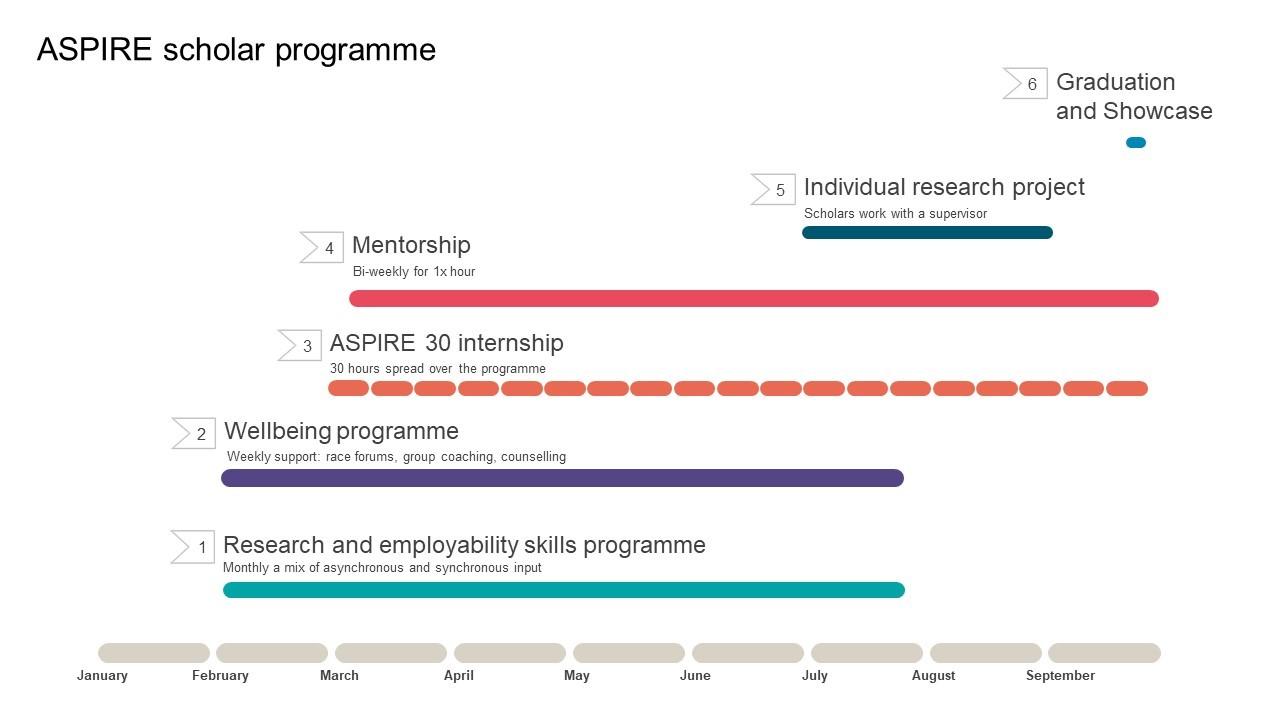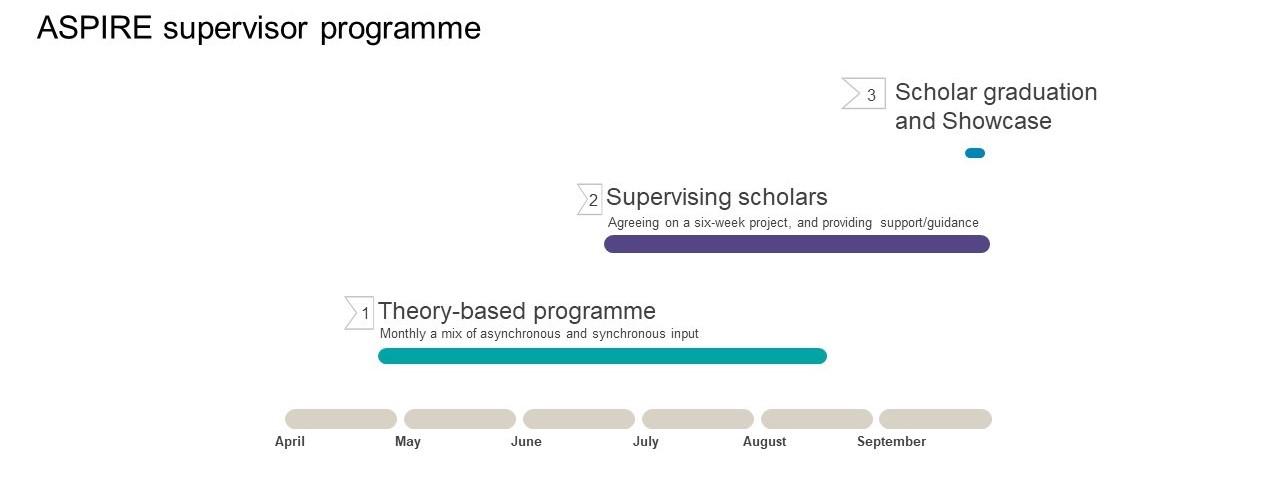What is the ASPIRE programme?
ASPIRE is a new unique intervention to address the Black PhD leaky pipeline. The Black PhD leaky pipeline was first highlighted by Williams, Bath, Arday and Lewis in 2019. They reported that out of nearly 20,000 PhDs awarded by research funders, 245 were awarded to Black or Black mixed students, with 30 of those being from Black Caribbean backgrounds.
ASPIRE is a reciprocal teaching programme, providing targeted packages of support and training for both students and academic staff based at Sheffield Hallam University or Manchester Metropolitan University and nearby higher education institutions (within 120-mile round trip of Sheffield) to address the Black PhD leaky pipeline.
Scholar programme is designed to provide research mentorship and wellbeing to improve graduate outcomes and access to doctoral study for Black and Black heritage students. Scholars and supervisors receive a large package of support funded by the Office for Students and Research England, outlined in the image below.

Supervisor programme is designed to improve the understanding of postgraduate research supervisors of the specific, racialised needs of Black students interested in accessing doctoral study and the ways in which Black students can be best supported. Scholars and supervisors receive a large package of support funded by the Office for Students and Research England, outlined in the image below.

Evaluation
The first cohort completed in 2022, with a total of 24 scholars taking part. The majority of scholars who started the programme were full-time students (62.5%), with a further third employed full-time (31.3%), and a few studying part-time (6.3%).
A difference-in-difference design was used to evaluate the ASPIRE programme. The scholars, supervisors and matched controls completed pre and post surveys, as well as interviews and reflective diaries.
The ASPIRE programme for scholars was intensive and had six different elements. Here are a few highlights from the first year of evaluation.
Key takeaways from the first year of evaluation
It was clear from the evidence gathered at the end of the ASPIRE programme that the scholars had flourished, growing in both confidence and self-belief.
Mentorship
Scholars met with their mentor approximately once a fortnight for an hour. The evaluation revealed that:
- mentors who had a shared lived experience (in this instance a shared Black or Black heritage background) led to strong mentor relationships
- where the scholar and mentor were easily able to identify their shared background, the mentor relationship has continued long past the duration of the ASPIRE programme
- in addition, invested mentors (those who had a personal reason for taking part) offered wider wellbeing support to the scholars, which the scholars believed gave them the support they needed to continue with the ASPIRE programme when they felt overwhelmed.
All of the mentors that were interviewed shared the individual success stories of their mentees (ie scholars). For example, one scholar got a distinction in their master's and, before they had completed their course, they had been offered “a job with this big bank” (mentor 3).
Research and Employability programme
The research and employability skills programme for the scholars is based around five pillars.

Focusing on the last two blocks: the quantitative and qualitative research training was delivered by Manchester Metropolitan Universities Q-Step programme. Through their unique approach Q-Step introduced the scholars to the basics in research, whilst providing a boost to their confidence. Many scholars reported after taking part in Q-Step they were viewed by their peers as “gurus”, and were “teaching others how” to analyse their data. This is a great example of the impact that the ASPIRE programme can have on the wider community.
“Every Black person in class, they were just coming to me because they heard, “you are ASPIRE scholars. They said you are very [knowledgable], you are a guru, you are well-rounded in it [quantatitive research].” (Scholar 9)
More on each individual aspect of the programme can be found here.
Much more than the content: safe space
The ASPIRE programme is much more than the delivered content. From the outset of the programme, the programme directors Dr Iwi Ugiagbe-Green and Dr Francis Awolowo created a safe space for the scholars to explore their lived experience.
“The race forums were brilliant, it is very rare you have the opportunity to share lived experiences with peers outside of your personal community, who can 100% relate to and understand the differences in the Black experience. To share and feel validated is rare.” (Scholar 1)
“And that’s where I think the confidence comes in because I think sometimes you don’t have the safe spaces to talk about some of these things or explore your creativity […] But for me, I thought that’s what made the programme stand out, those elements that Iwi and Francis were really adamant on including and the kind of, the wellbeing side of things.” (Scholar 5)
Scholars made the connection between these safe spaces providing the room for them to flourish. Acknowledging the “barriers” while “building your own confidence in yourself and your self-belief” so you can “keep focused on what you’re doing…even if it means kicking down a few doors” (scholar 2). But, more than that, these spaces helped the international scholars with loneliness (scholar 6), and provided support while they negotiated cultural differences (eg difference in lecturers being willing to chat and share their phone number), creating a valuable support network.
At the showcase event at the end of the ASPIRE programme, scholars shared their ASPIRE journey through poetry, affirmation banners and other artefacts they created as part of the ASPIRE programme. They shared that they now see themselves as tenacious, brave, courageous and resilient. Paired with the quantitative and qualitative evidence, it is clear that the ASPIRE programme directly builds confidence.
Keep an eye on the ASPIRE LinkedIn page for more details
References
Williams, P, Bath, S, Arday, J and Lewis, C (2019) The broken pipeline: Barriers to Black PhD students accessing research council funding. Leading Routes.
Accomplished Study Programme in Research Excellence (ASPIRE) for Black students: Fixing the broken pipeline
ASPIRE is a reciprocal teaching programme, providing targeted packages of support and training for both students and academic staff based at Sheffield Hallam University and nearby higher education institutions (within 120-mile round trip of Sheffield) to address the Black PhD leaky pipeline. Read the report here.
Advance HE Insights Team
Find out more about our Insights Team and how they can work with you.